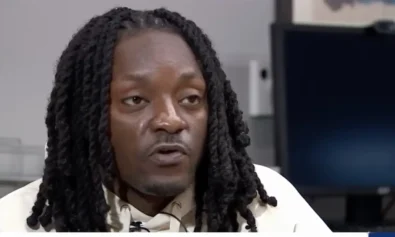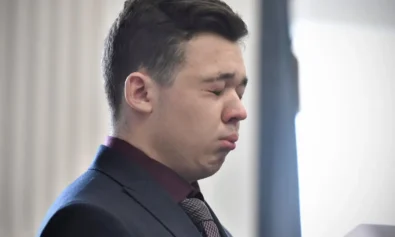The owner of a small trucking company in North Carolina has been fighting a years-long legal battle against Phoenix, Arizona, police for the seizure of thousands of dollars he saved for a new truck to expand his business.
Jerry Johnson’s attorneys said authorities confiscated $39,500 from the business owner and accused him of being a drug dealer in August 2020. He was never charged with a crime, but more than two years later, the Phoenix police have not returned the money to Johnson.

A Maricopa County Superior Court judge ruled after a hearing last year that Johnson could not prove that he didn’t obtain the money through illegal activity. His attorneys with the Institute for Justice filed an appeal, arguing that the sole issue that was supposed to be decided at that stage of the case was whether Johnson owned the money.
In May of this year the appellate court ruled in his favor and sent the case back to the superior court for a second review. The decision was made public last week, giving it a precedent for other cases.
Johnson is waiting to see if the state will appeal the decision.
“I flew to Phoenix thinking I could get a good deal on a truck that would allow me to expand my business,” Johnson said in a video statement. “Instead, the police took my money without ever charging me with a crime. It’s been a struggle to lose my savings, and now my business is barely getting by.”
Johnson said he did his research and found a good deal on the semi-truck he wanted at an auction in Phoenix. He scraped up money from his savings and got help from relatives to secure the nearly $40,000 he needed to purchase the vehicle. He packed the money in two cardboard boxes — $7,500 in his carry-on backpack and $32,000 in his checked luggage on August 17, 2020, which was legal, according to his attorneys.
However, when Johnson went to collect his baggage, Phoenix airport police searched his bags and accused him of money laundering.
Johnson spent time in prison for cocaine possession in the mid-2000s and was arrested for marijuana possession in 2012, court documents show. The airport police claimed the money smelled like marijuana, but Johnson said he had turned his life around since being arrested for the drug charges a decade ago.
Johnson registered Triple J Logistics LLC in Maryland in 2015. He has two North Carolina commercial driver’s licenses. Now, the business is suffering because he lost the money, he said.
“We’re just barely making ends meet right now,” he said.
The officers ordered Johnson to sign a “Disclaimer of Ownership” form, which his attorneys argued that he agreed to do out of fear “he would be arrested and sent to jail.”
Phoenix police confiscated Johnson’s money under Arizona’s civil forfeiture law. Law enforcement agencies could seize and keep property without ever charging the owner with a crime at the time of Johnson’s encounter with Phoenix police. The lower court ruled that Johnson did not show that his ownership of the money was “innocent.”
Law enforcement agencies in Arizona have forfeited more than $530 million over the past two decades under the law, according to 2020 data collected by the Institute for Justice.
“Civil forfeiture threatens everyone’s property and due process rights,” said Paul Avelar, the Institute for Justice Arizona Office Managing Attorney said in May 2021 new release. “The government can take your car, your home, and your life savings without ever charging you with a crime, much less convicting you.”
State lawmakers have acknowledged issues with the law. Arizona Gov. Doug Ducey signed a bill in May 2021 that increased due process protections for property owners. Some of those reforms could’ve changed the outcome of Johnson’s case if they were already law.
The amended law requires a conviction in criminal court to confiscate property in civil court, in some instances, in line with 15 other states, including Virginia, Oregon, California and Missouri. The updated law also requires the government to prove that property owners are not innocent before taking their property. Fourteen other states and the District of Columbia also put the burden of proof on the government.
Law enforcement agencies can no longer require property owners to sign over their rights to their property as they did to Johnson. However, the Charlotte-based business owner’s legal battle continues.
“I’m fighting for my money, but I’m also fighting because this should never happen to anyone else,” Johnson said.

Prosecutors had argued that Johnson appeared nervous during the Phoenix airport encounter with police and they also found three phones in his possession. Johnson presented his business and commercial licenses to the court, Triple J’s recent bank statements, tax returns from 2015 to 2018 and cab registrations for his two trucks.
“Much of the State’s complaint invokes Jerry’s criminal history, but the State alleges no facts that would connect Jerry’s criminal history to the seized cash,” the attorneys argue in the appeal.
Johnson’s uncle signed a notarized affidavit stating that he lent his nephew $9,000. Bank statements show Johnson transferred a total of $19,500 from his business account to himself from August 2018 to August. His fiancée also helps with his finances, his attorneys said.
However, prosecutors argued that Johnson had visited Phoenix before with his cousin, who had also been convicted of a crime. His uncle was also incarcerated in the past and Johnson would send money to his uncle and cousin while they were behind bars.
Detectives also pointed out that his airline ticket was booked last minute and the auction had stopped taking cash because of the COVID-19 pandemic. His attorneys argued that he was not aware of the policy change.
“Law enforcement continues to routinely seize money at airports and take it without charging anyone with a crime,” IJ spokesperson Andrew Wimer told Atlanta Black Star. “We hope that people learning about Jerry’s case and other clients who have had their money seized will motivate lawmakers to end civil forfeiture and only take property through a criminal process.”


